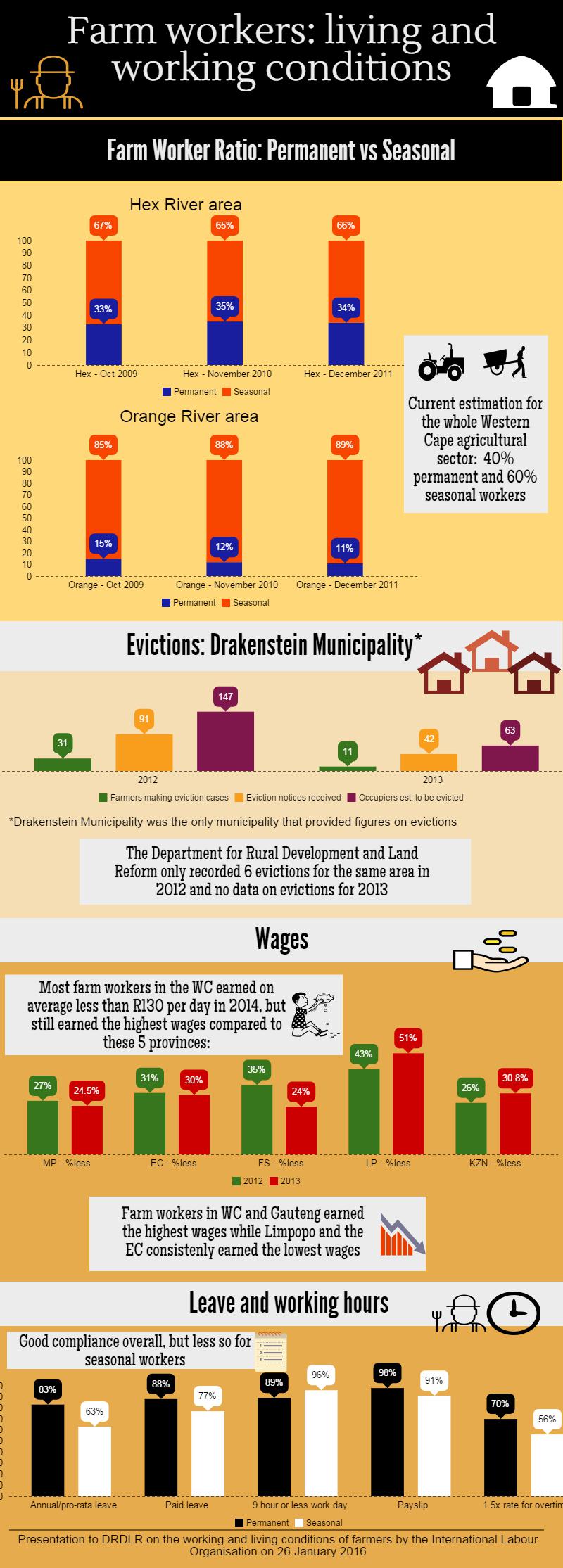The 2011 Human Rights Watch report alleged wide spread abuse of workers on Western Cape farms and in November 2012 the De Doorns strike broke out. Mr Stone Sizani, then Chairperson of the Portfolio Committee on Rural Development and Land Affairs, suggested that a comprehensive study be conducted to find out what are the conditions on farms and what factors are contributing to tensions in the industry. Such a study was commissioned by the International Labour Organisation (ILO) and the results were first released in June 2015. The study consisted of 10 case studies conducted on five farms, in eight provinces. Researchers interviewed 48 farmers, 208 farm workers and conducted group interviews with 250 labourers, and a further 90 interviews with government, agriculture organisations, trade unions and NGOs.
On Wednesday, 27 January 2016, Margareet Visser of the Labour and Enterprise Policy and Research Group (LEP) and the Institute of Development and Labour Law at UCT, presented the findings of the study to the Portfolio Committee on Rural Development and Land Reform. According to Ms Visser, the deregulation of the sector means that new entrants to farming have to survive increasingly cut-throat conditions without the support that white commercial farmers previously benefited from under the Apartheid regime. This led to:
-
A 30% decline in farming units over 10 years
-
Average solvency of farms declined to the worst levels in 30 years as debt growth outstripped asset growth
-
A 30% decline in the number of farm workers over 20 years
I- ncreased casualisation and externalisation (seasonal workers and the use of contractors)
While the study found that farmers were fairly compliant with mandatory leave and working hours, most farm workers in the Western Cape earned less than R130 per day in 2014 but that those workers in the Western Cape and Gauteng were still “relatively better off than those in the rest of the country”. It was also found that farmers in Limpopo paid farm workers well below the legally required minimum wage. Farmers are increasingly reluctant to invest in on-farm housing because they argue that the Farm Workers Housing Assistance Programme (FWHAP) comes with too many strings attached. With the increase of seasonal workers, the biggest housing need is not for permanent farm workers, but for seasonal farm workers. The FWHAP does not provide financial assistance for housing for seasonal workers and farmers preferred to hire seasonal workers who did not live permanently on the farms so they did not have to provide free transport, housing and other benefits.
During the field work, it was alleged that there was a new surge of evictions in the Western Cape, especially in the Drakenstein municipality. Evictions off farms were important to the reference committee that had commissioned the research, but the researchers said that it was difficult to obtain reliable data. Of the municipalities approached, Drakenstein most consistently collected data on evictions, but even from their data, the picture is unclear. It became clear that data on evictions is not consistently collected and seemingly contradictory. There are complaints that the Department’s hotline to report evictions is not functional, that the police are not recording evictions, that workers and farmers did not know their rights and that municipalities are not equipped to deal with evictions.
The exchange between the Committee and the research team became somewhat heated when Ms Visser criticised government policy on deregulation and the reduced subsidies and the impact it has on farm labourers. MPs questioned why there were not much data on evictions, whether organised labour organisations were consulted and whether the impact of labour brokers were investigated.
An audio of the meeting and its documents here - written report of the meeting to follow shortly.
See infographic below to see a breakdown in numbers on the working and living conditions of farmers:



Comments
Keep comments free of racism, sexism, homophobia and abusive language. People's Assembly reserves the right to delete and edit comments
(For newest comments first please choose 'Newest' from the 'Sort by' dropdown below.)